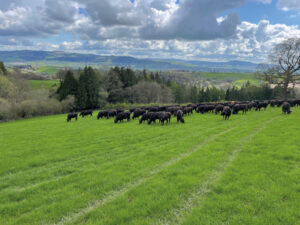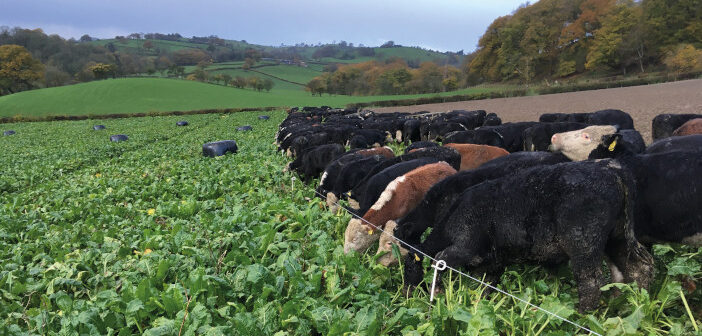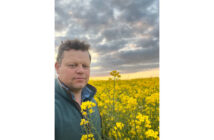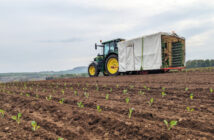Dry summers, steep fields and shallow topsoil have presented a series of challenges to our 2023 Grassland Manager of the Year, who has responded by diversifying and building resiliency in his family’s livestock business.
It’s a beautiful view from Marc Jones’ farm, part of the Powis Estate high above Welshpool. It’s no surprise that in the mid-90s his parents David and Jane turned part of the farmhouse into a bed & breakfast, now supplemented with two self-catering units which were established in 2017.
As stunning as the scenery is, however, it has presented its fair share of challenges to the family. The farm has always been in a rain shadow, with a far lower annual rainfall than places just ten miles away, and this has been compounded in recent years by long dry spells which have reduced grass growth. The farm’s position between 600 and 1,200 feet above sea level might provide a wonderful view for visitors but it also makes the ground steep, with shallow soils over shale rock that struggle for moisture during the summer.

Marc Jones, centre collected his award in February from Omex district sales manager Neil Hayne, and host Patrick Monahan
Marc joined his parents in DG & JM Jones ten years ago, having spent time as a beef and sheep consultant for ADAS, and completing a scholarship in New Zealand. “I brought a lot of that knowledge from New Zealand back to the farm,” he explained. “At the time, we were lambing indoors and kept a suckler herd which spent six months housed every year. We were profitable but like a lot of farms in the area, a big proportion of that profit came from the single farm payment.”
Working with his parents, Marc started to implement different techniques. Over time the 700-head flock of breeding ewes has moved from Welsh Mules to NZ Romney sheep and has been moved to a permanently outside system, with rotational grazing and outdoor lambing. Moving away from the suckler herd, the farm runs a finishing cattle business for Angus dairy beef heifers. 350 animals are brought in at 150kg and taken through to finishing at 600kg between 22 and 24 months.
To put in place the rotational grazing system, the farm needed work with new fences put in (David also operates a fencing contracting business which runs through the winter), and a borehole was put in to provide access to water at all points of the farm. Fodder beet is primarily used for overwintering, with silage bales placed in the beet so that the fields are strip grazed, which Marc says they have had a lot of success with.
“We’ve also experimented with different mixes of herbal leys,” he said. “Our ryegrass and clover mixes have really struggled with the dry weather so we’re looking at more deep rooting varieties such as cocksfoot, tall fescue, chicory and plantain.Lucerne is another crop we’re looking at, although I’m concerned that this would require deeper soils than we have, which would help reduce our reliance on brought in feed during drought.”
The last 12 months have been particularly difficult. The lack of rainfall has seen grass growth knocked back to the same rate as during the winter. To keep live weights gains where they need to be, the farm has had to supplement feed with bought in straw and barley, which has a significant impact on the bottom line.

The Joneses frequently see less rain than surrounding areas which has hampered grass growth in recent years
“It’s difficult when we’ve worked hard to make our system as low-cost and efficient as possible,” Marc said. “The weather has always impacted farming but it’s becoming increasingly unpredictable.”
One of the ways they have tackled the limited grass growth is to pre-mow in front of the cattle using a Malone mower. Taking the heads off established grass crops to stimulate quality re-growth. They also purchase chicken muck from local farms to boost the organic matter in the soil. Marc has continued to learn about the best ways to maximise grass growth, and subsequently liveweights across the livestock. The farm is part of the Grasscheck GB monitoring network, with samples taken fortnightly for analysis of rotational grazing.
“We have a weather station as part of that, which has helped us monitor the rainfall on our farm, and we’ve been able to see the impact of our methods compared to our peers,” he noted.
The different methods on farm have had other advantages. Improved soil health and different species have helped them cut fertiliser and spray applications by around 80%, with foliar fertiliser used for improved efficiency, especially in the dry conditions. There is some flexibility in this system; the farm has increased from 200 to 700 acres since David and Janes first moved there in 1986.
“As neighbouring farmers have retired, the Powis Estate has allocated more ground to us but some of these farms have been lacking in macro and micronutrients, so as well as fencing the fields to fit our system, we have had to look at nutrient management when additional land comes into the business,” he said.
For the future, Marc is paying close attention to the environmental schemes put in place by the Welsh government. He expressed some concerns over the rumoured requirement to put 10% of Welsh farms down to woodland, which would not work on Estate-owned ground, but is keen to take part in any schemes that would help to bolster income.
“We’re all in on the environmental schemes, and we’re looking at how we can farm more regeneratively,” he explained. “We’ve already increased our efficiency to a point where we could easily handle more stock if we needed to. We move the sheep and cattle daily, and during lambing I maybe had to lamb 10 of the ewes out of 700. Now our focus is making the business as resilient as possible.”
He concluded by saying he was thrilled to be awarded Grassland Manager of the Year back in February. “It was completely unexpected, but it shows that what we are doing is working. We keep trying something new every year so that we can continue to develop our methods.
“It also helps with my consultancy work. I still spend time on arable farms helping them to integrate grassland and livestock into their businesses, so an award like this helps every aspect of what we do.”
More information
Read about the 2023 NAGA winners here.
For news and updates about the 2024 NAGA awards, nominees and winners, follow
National Arable and Grassland Awards
#NAGAwards




